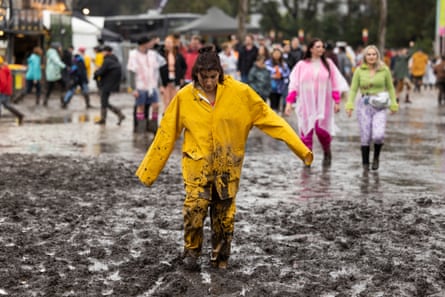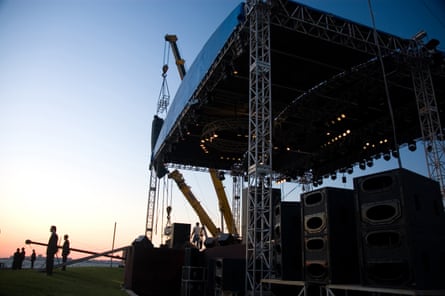Last month, the US musician Santigold printed a long statement to social media asserting the cancellation of her upcoming Holified tour. “As a touring musician, I don’t suppose anybody anticipated the brand new actuality that awaited us [after the pandemic],” she wrote, citing two years of no revenue; the skyrocketing price of fuel, flights, and inns; a flooded market of delayed excursions, resulting in overbooked venues and audiences; and the chance of an infection, alongside normal exhaustion and poor psychological well being.
“I feel it’s vital for individuals to know the reality of what it’s like out right here for artists,” she continued, “and I don’t imagine sufficient of us are speaking about it publicly.”
Santigold isn’t alone. On 10 October, Animal Collective cancelled their UK and Europe tour, pointing to an “financial actuality that merely doesn’t work”. On 6 October, Sampa the Great announced she was rescheduling her forthcoming European reveals, citing tour exhaustion and monetary dangers; a couple of days earlier, the Avalanches cancelled their remaining North American tour dates as a result of “severe sickness”.
The month earlier than, the UK rapper Stormzy nixed his upcoming Australia and New Zealand tour – a full three years after the unique announcement; Justin Bieber as soon as once more postponed his world tour, citing well being causes; and Australian alt rockers Gang of Youths cancelled their upcoming North American dates, with their frontman, Dave Le’aupepe, writing in a statement: “I’m attending to the purpose the place the stress of journey, sickness and feeling continually hampered by accidents and bodily shit sustained on the street is taking a major toll on my wellbeing total.”
Permit Fb content material?
This text contains content material supplied by Fb. We ask in your permission earlier than something is loaded, as they could be utilizing cookies and different applied sciences. To view this content material, click on ‘Permit and proceed’.
In accordance with knowledge from a survey by I Misplaced My Gig Australia, between 1 July and 31 August final 12 months, 32,737 Australian gigs were cancelled – equating to almost $94.3m in losses in simply two months. That’s an enormous blow for the modern music sector – a sector which Reside Efficiency Australia discovered contributes most to the dwell efficiency market share, drawing $1.1bn in revenue in 2018.
However these two months measured by I Misplaced My Gig fell in the midst of a pandemic that had shut down many of the trade. Greater than a 12 months later, we’re in a position to get pleasure from dwell music once more – so why are so many musicians nonetheless cancelling their reveals?
Costly flights, low cost charges: the price of touring
Because the trade makes an attempt to get better, a wealth of points proceed to wreak havoc on touring – and lots of of them are monetary.
As a musician myself, I can say from expertise that Australia has at all times been tough to tour profitably. Beginning out, you is perhaps provided a gap slot on the nationwide tour of an even bigger artist – an important strategy to expose your music to a wider viewers, however not one which pays properly (many assist artists are paid as little as $100 a present). And to hit all the most important cities, it’s nearly not possible to tour Australia by street – which means you’ll want to purchase flights for your self, your band and in some instances your workforce and crew.
“There’s a lot cash that goes into it – and except you might have the means to fund a tour, after which doubtlessly lose all that cash, there’s no hope,” says Heather Riley, one half of Melbourne-based punk duo Cry Membership. “Flights are so costly in the intervening time. We will solely do half excursions if we get assist slots, as a result of we will’t afford to go to Perth.”
Festivals, too, should not proof against hovering prices, staffing points, and low client confidence – to not point out the destruction wrought by climate change over the previous few years.

Excessive climate occasions have brought about the cancellations or postponements of a minimum of 9 main Australian music festivals in 2022, based on Sydney Morning Herald. This checklist contains Splendour within the Grass, This That and Strawberry Fields, leading to lack of revenue not only for promoters however for hundreds of artists, crew, stall holders and different personnel counting on the weekend of labor.
And for artists, it’s not simply in regards to the lack of charges (which will be something from a couple of hundred {dollars} to tens or tons of of hundreds); additionally they lose the viewers attain a competition set can deliver.
A cashflow drawback – and a confidence drawback too
Whereas prices are rising, artist charges should not – and tickets to common reveals are harder to move than ever. Many followers aren’t able to return to the crowded, sweaty mosh; others are coping with the price of residing disaster. And excluding blockbuster reveals, individuals who do purchase tickets are tending to purchase them last-minute – making a cashflow drawback for artists, and a confidence drawback too.
“As a result of we don’t have as many individuals shopping for pre-sale tickets, we don’t have a transparent understanding of how a present goes to carry out,” says Shannen Egan, a Melbourne-based artist supervisor. “We’re wanting on the numbers, we’re wanting on the inflation of touring prices, and asking if that is actually sustainable.”
After two years with out audiences, bands don’t actually know the place they stand with their followers proper now. A Melbourne band might need been in a position to promote out a 300-capacity room in Sydney on the finish of 2019 – however after three years with out a tour, what number of tickets may they transfer now? And if individuals aren’t shopping for tickets prematurely, you’re caught guessing whether or not or not you’ll break even, which might result in some devastating last-minute selections. “If a venue is paying you a lower of ticket gross sales versus a assure [flat rate], you’re completely extra prone to pull the plug on a present if there’s much less pre-sales,” says Riley, from Cry Membership. “That may lose you a ton of cash when you’re travelling interstate or abroad.”
I’m gonna say it:
Regardless of the courageous faces, the dwell music trade is FUCKED after Covid. Shit’s arduous out right here. In the event you can afford it, please purchase tickets to reveals. It actually helps artists, musicians, crew members and all of the individuals behind the scenes survive and keep within the sport— Alex Lahey (@AlexLahey) September 27, 2022
In the course of the peak of the pandemic, the federal authorities’s jobkeeper and jobseeker schemes, state-based reduction funds and trade physique grants stored many music trade staff above the poverty line whereas touring was not possible. However now, the funds have completed, there’s nonetheless a lack of live performance insurance and we’re in the midst of an inflation disaster, with little or no assist obtainable to these making an attempt to navigate a broken trade. And because the overwhelming majority of musicians and crew are contract staff, if a tour will get cancelled, nobody will get paid.

To fight low artist charges that don’t replicate the rising price of residing and of touring, a minimal wage for musicians has been put ahead by Musicians Australia, a union for working musicians in Australia.
Paul Davies, director of musicians at Media, Leisure and Arts Alliance and Musicians Australia, says that if the $250 minimal wage is just not launched and enforced, the trade “is predicated on exploiting musicians”.
“Within the music trade, musicians are on the backside of the availability chain. With out a minimal wage, unmanageable dangers are shifted on to musicians.”
Final 12 months, the higher home of the NSW parliament handed a decision in favour of a $250 minimal charge for musicians enjoying at publicly funded occasions – a decision that was already in place in Western Australia, South Australia and Queensland. The Victorian authorities’s Reside Music Restart funding, in the meantime, was solely distributed to venues and occasions paying musicians $250 a gig.
‘Don’t disgrace them for his or her honesty’
In Could, the Swinburne College of Expertise launched a research surveying 1,300 individuals working in dwell efficiency and music. Greater than half of respondents had experienced suicidal thoughts – over four-and-a-half occasions the proportion of the overall inhabitants – and multiple in ten of them had acted on them.
Almost two in three reported excessive or very excessive ranges of psychological misery, making it 4 occasions as widespread as within the normal inhabitants. Amongst susceptible teams, the proportion of extremely harassed respondents was even worse: 83% of non-binary individuals, 72% of girls, 75% of individuals below 35, 81% of individuals with a incapacity or long-term well being situation and 81% of individuals on a really low revenue.
Casey O’Shaughnessy, a reserving agent at Australian firm Choose Music, believes audiences ought to attempt to be extra understanding when artists cancel reveals, significantly in the event that they’re cancelling as a result of psychological well being causes. “After the final couple of years, greater than ever earlier than, there’s a willingness within the leisure trade to discuss psychological well being struggles and the relentless calls for of touring,” she says.
“If an artist does occur to postpone or cancel a tour – particularly as a result of psychological well being struggles – don’t disgrace them for his or her honesty and humanity.”






